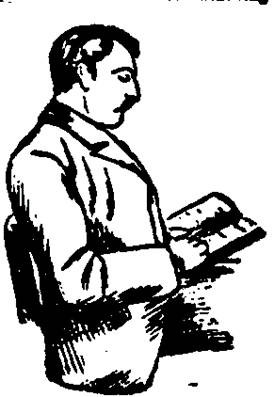This article has been transcribed from a copy of the Cardiff Times in the online collection of scanned Welsh newspapers 1804-1919 in the National Library of Wales, with grateful recognition of the free access accorded to all readers. Paragraph breaks have been introduced for easier reading.
Notes
Elsewhere 'Samuel' defines a masher as 'the sort of young man who fancies that he can overcome and overawe everybody by the potency of his attractions' (12th May 1888) How to Live Within One's Means. The youth of the masher, which in earlier years seems to have been a necessary quality, is no longer a criterion for masherdom.
Harvest and The Middleman have not been definitively traced. A play entitled 'Harvest' was on in New York in 1886, and was perhaps the same as Harvest Home by Thomas Parry (1847, revived in the 1880s?). Ireland As It Is, or, The Middleman by John H. Amherst (1855) which was running in 1889, may be the play Samuel names as 'The Middleman'. —— David Skilton

he old gentleman who, unaccustomed to play-going, objected to Hamlet, on the ground that it contained too many quotations, was happily a type of the dramatic patron but rarely met with nowadays. There is perhaps no class of people which is so varied as the playgoing portion of the British public, and there is certainly no section of the public which is so positive in its opinions or so difficult to satisfy in the matter of its likes and dislikes. Patrons of the drama are a powerful body, and they know it. Their word is law, and the manager or actor who attempts to dispute their dictum is certain to get the worst of the argument in the long run. A well-known manager on the old Bath circuit once said to a critic on the failure of a new and artistic drama, 'The British public is an ass, sir.' 'That may be,' replied the critic, 'but it is your master, and if you do not give it what it wants it won't come to your theatre.' The manager's statement will apply frequently: the critic's always.
Old-fashioned play-goer.

A change has come over the patrons of the drama during the last half-century, and the great majority of the modern play-goers are a different class of people to those who went to the theatre in the days of their fathers and grandfathers. In the old days play-goers went to the theatre for recreation and intellectual instruction. They were familiar with most, if not all, of the plays they went to witness, and could discuss and criticise with intelligence the methods of the different actors they saw in the same parts. To them pause and inflection had a meaning, and a change in the 'business' of a piece or in the delivery of a line was noted at once and argued out to the bitter end after the performance, in some adjoining hostelry — not unfrequently with the actor himself. This led to an intercourse between patron and artist, which was bound to result not only in friendly feeling, but in intellectual development to all parties concerned. Patron and actor were drawn closer together by these friendly arguments, and many a nice point has been permanently settled in one of these after the-play conversations

The playgoer's aversion.
It is not so now-a-days, and the intellectual intercourse between artists, critics, and patrons is of the scantiest nature. The style of actor known to our forefathers is gradually dying out, and in his place is to be found another type of Thespian. He is an offspring of the genus masher, and is imbued with a due sense of his own importance. He has, owing to the travelling company system, but small chance of learning the details of his art, but he talks with an air of authority about acting, and although his repertoire and experience, after some years in the country, may be limited to half-a-dozen parts, he is prepared to tackle any part, however big, and that with no doubt as to his ability to play it satisfactorily. Confidence is. of course, necessary to the actor, but over-confidence is certain, sooner or later, to develop into fatal egotism. Theatrical egotism is frequently the outcome of adulation on the part of a not too discriminating public.

Studious play goer.
The weak spot in the amour of the present day-playgoers is the fatal fact that they have strong likes and dislikes, and once an actor pleases them they can see no fault in him. This is more so, even, with actresses and many a lady not over-burdened with talent, has had a position made for her by the public which she could never have made for herself, but for the accident of a peculiar part or piece. Just let us take a glance at one or two individual types of playgoers. They will repay us for our trouble. One stamp of patron has always interested and amused me. He has a confidence in his ideas and opinions which can only be the outcome of youth and inexperience. His criticisms are of the most concrete orders, and he generally sums up anything but burlesque or vapid comic opera as 'rot' — with an adjective. To him sentiment is 'rot,' dramatic ideas and situations are 'rot,' an actor's pathos is 'rot,' and the years of patient work which have enabled an actress to pourtray [sic] the purest and strongest feeling of love but result, so far as he is concerned, in the reproduced passion being labelled 'rot' — with an adjective.
He has never taken the trouble to read anything about dramatic art, his ideas as to elocution are vague, and his knowledge of the principles of acting are conspicuous by their absence. Yet he expresses his opinions with an air of authority and damns in a few words to those who take his opinion, work which has cost years of experience to perfect and hours of thought to work out. My opinion of his critical faculties can only be expressed by his own pet word 'rot.' He is the artist's bugbear, and is responsible for more frivolous inanity and degraded art than any other specimen of the British public.

Masher playgoer.
Interesting to a degree are playgoers of the old school, who tell you stories of the bygone days, and enter into comparisons between the actors of their day and those of the present. They usually stick up for the old school, and in the main they are right, for acting to-day is not so thorough as it wasin their day. These playgoers invariably point out that in their days men never had plays built to fit them, that they played anything and everything in their line, and that a man might play Hamlet one night and a totally different character the next, and they ask you, with conscious pride, what the present generation of actors would say if they had to play 12 and 14 parts in a week! They are very proud of the old days, and. rightly so, for in them was built up the fabric of the art of acting, which I am much afraid is gradually decaying. Students of the drama are to-day, I fear, few and far between. In fact, so limited is their number that when one of them, with book on knee, appears in the pit of a theatre he at once becomes an object of interest. He is usually very much in earnest, but I am afraid he has more work in front of him in his desire to elevate the stage than he wots of.
Amusement is the war cry of the playgoer of to-day, especially in the provinces, and unless a play helps him to forget his cares it has but small chance of success. That thoughtful plays do not suit the taste of the provincial public is proved by the financial failure of such dramas as Harvest and The Middleman, the latter of which is, to my mind, one of the plays of the present age. It is commercial in its ideas, yet one of the largest commercial towns in the country declined to patronise it. The frequent cry of some playgoers is that they do not get good things. It is their own fault, they get what they support. Theatrical managers keep shops, and they must supply to their customers, as do tailors, grocers, or butchers such goods as they desire to purchase, and, as a manager of note said the other day, if they support good plays they will get them, and if they do not they will, in all probability, get bad ones.
Links to Related Material
Last modified 19 April 2022